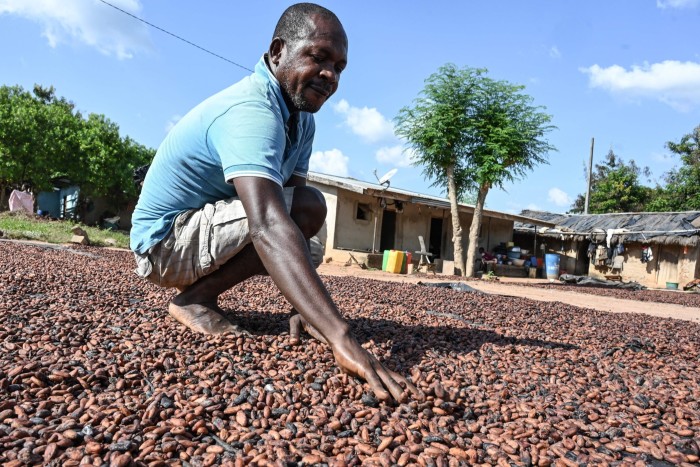Hotel Chocolat’s acquisition last week by Mars handed a sweet payout of £280mn to the UK boutique chain’s founders. It also filled a hole in the family-owned US confectionery giant’s brand mix.
Big chocolate companies have been shaking up their portfolios as consumer demand grows for healthier and more sustainably sourced options and governments crack down on unhealthy foods.
While some have developed lower-sugar versions of popular treats, they have not proved a hit with chocolate lovers, prompting snack makers including Mars, Hershey and Nestlé to focus on buying up higher-quality or healthier brands.
Andrew Clarke, global president of Mars’s snacking division, said Hotel Chocolat “fills a gap in our portfolio”, adding that the group had already pursued a premiumisation strategy with its petcare business and its “better for you” line-up of healthier snacks.
Mark Lynch, partner at corporate finance boutique Oghma Partners, believes confectioners have little choice but to move up the value chain to higher-end products.
As healthier snacks take market share, he said, companies heavily weighted towards sugary treats would “have to sell more at a higher price — go more premium . . . You can’t stand still in any of these markets, you have to develop more growth engines.”
Mars Snacking is dominated by mass-market brands such as M&Ms, Snickers, Twix and Maltesers, and until this week’s deal it had no position in the premium category occupied by the likes of Lindt and Godiva. That is in contrast with rivals such as Nestlé, which this year bought Brazilian premium chocolate maker Grupo CRM, and Mondelez, which in 2021 acquired vegan and Paleo chocolate brand Hu.
Procuring cocoa has long been a murky business. More than 70 per cent of the world’s crop is grown in Ivory Coast and Ghana by farmers who receive as little as 5 per cent of a chocolate bar’s retail price. Entrenched poverty means child labour and deforestation are rife. Since 2000, cocoa production has driven 37 per cent of Ivory Coast’s forest loss in protected areas, and 13 per cent of Ghana’s, according to recent analysis.

The EU is trying to tackle this with new legislation. In January a landmark regulation designed to force companies to report on environmental and human rights abuses in their supply chains comes into force. It is coupled with new rules banning products linked to deforestation.
Companies that focus their marketing around sustainable sourcing have grown rapidly. Tony’s Chocolonely, whose distinctive brightly packaged bars have become a fixture in stores across the UK, US and Germany, reported a 21 per cent jump in sales to $142mn in its most recent financial year.
Clarke said Mars saw “a lot of opportunity in the sustainable space”, and that Hotel Chocolat’s sustainability credentials were part of what made the acquisition so attractive. Hotel Chocolat says it invests 10 per cent of its profits into its sustainable farming initiatives and paid farmers a premium of $250 per metric tonne above the market rate for cacao beans in 2022.
Jack Steijn, founder of Equipoise, a Netherlands-based cacao consultancy focused on improving sustainability, said premium producers tended to be more sustainable than mass-market brands whose supply chains were largely driven by price.
“There is more margin for sustainability costs,” he said, adding that “many of those chocolate makers will have the sustainability story in the wrapping of the bar” for their more ethically minded consumers to read as they snack.
He added that the fact cocoa for premium chocolate is often sourced from a single origin made it easier for high-end producers to ensure sustainability in their supply chains.
While the cost of living crisis has led consumers to trade down to cheaper products across the food and drink sector, people have been buying as much chocolate as before despite record price rises. Confectionery and fizzy drinks sales have been strong, thanks to their position as affordable luxuries.
However, soaring cocoa prices could hit demand if chocolate makers raise prices much further. The commodity’s price reached a 12-year high this year as disease and drought resulting from the El Niño weather pattern hit cacao crops in Ghana and Ivory Coast.
“We’re at record highs at the moment on the London contract and New York prices are equally as crazy,” said Paul Joules, cocoa analyst at Rabobank. Cocoa futures traded in London were at $4,069 a tonne on Friday, up about 70 per cent from a year ago.
While high cocoa prices had not yet translated into consumer price rises in Europe, said Joules, they had in North America where contracts between producers and retailers were easier to adjust. Cocoa grindings — a proxy for demand — were down 18 per cent year on year in the region in the third quarter.
Joules expects big European chocolate companies to see a fall in sales in their first and second-quarter results next year, which could lead to cocoa prices slightly easing, according to Rabobank’s predictions.
“We may be in for a recessionary period, consumers are tightening their belts,” said Lynch. “But the longer-term trend for premiumisation will bounce back.”
Alongside its move into high-end chocolate, Mars has invested in the healthier end of the snack market.
Clarke said Kind, the high-protein, gluten-free snack brand the group acquired in 2020 for $5bn, was now being sold in 30 different countries and bringing in annual sales of more than $1bn.
Other chocolate giants have also started selling granola bars. Ferrero bought Eat Natural in 2020, while Mondelez bought Clif bar last year. Meanwhile, Hershey’s efforts in mergers and acquisitions have eschewed sweets altogether, aiming instead for salty snacks such as Dot’s Pretzels and Pirate’s Booty, which makes healthier savoury snacks for children.
Mars sees huge potential in what it calls “permissible” snacking and has set a target for 30 per cent of its snacking portfolio to be made up of healthy products by 2030, according to Clarke.
“The big picture here is snacking is a very attractive category for us to be in and the growth rate has changed a bit during Covid, but accelerated nicely,” said Clarke.
This post was originally published on this site be sure to check out more of their content.






